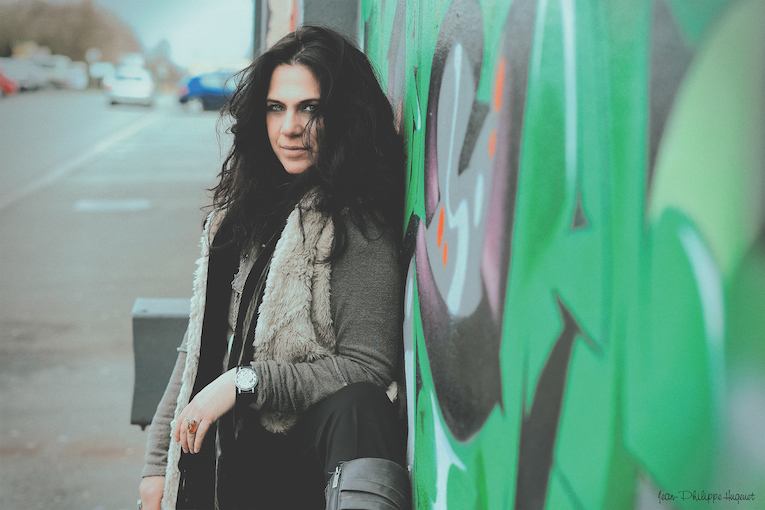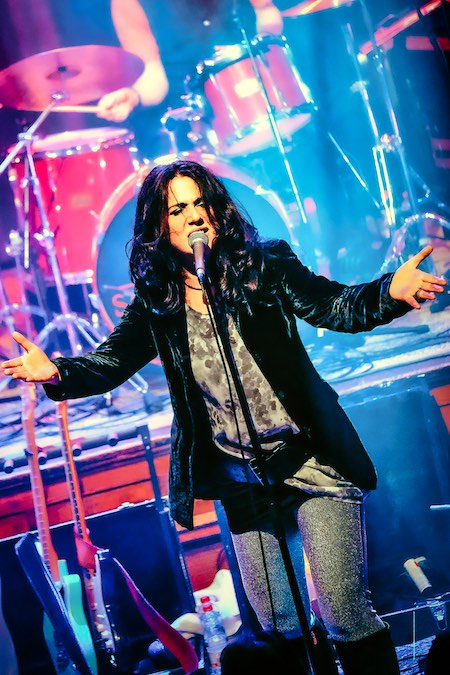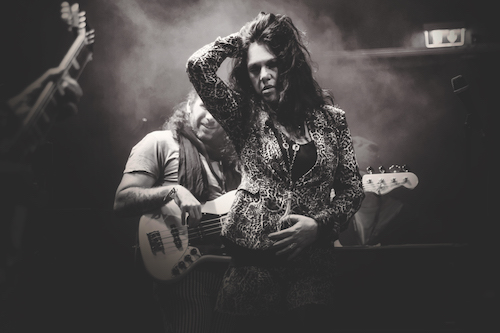
Photo: Sari Schorr by Jean Philippe Hugeuet
By Martine Ehrenclou
New York-based, blues/rock vocalist and songwriter Sari Schorr has a voice like no other. Powerful, deeply soulful, with rich texture and a 5-octave range, Schorr has captivated fans around the world. In 2016, Sari burst onto the blues/rock scene with her debut album, Force of Nature, out on Manhaton Records, produced by the legendary producer, Mike Vernon (David Bowie, Eric Clapton, John Mayall, Fleetwood Mac, Peter Green). 2018 saw her critically acclaimed sophomore album, Never Say Never (Manhaton Records,) delve deeper into her personal life through insightful, vibrant songwriting, evoking passion and grit. Operatically trained, Schorr is no stranger to comparisons to Grace Slick or Janis Joplin. But this songstress has a sound and style all her own.
Sari’s success comes after years of touring the world, from the South Bronx of New York to her performance at Carnegie Hall. Known for her passionate and high-energy live shows, Schorr has also performed at Montreux Jazz Festival, Ottawa Bluesfest, Notodden Blues Festival, and many more across Europe, Canada and the UK. The multi-talented vocalist, songwriter, pianist is most at home on the road with upcoming tours in Europe, Scandinavia, and the UK. COVID derailed her November tour with the great Robin Trower. Yesterday COVID forced postponement of her headlining Fall concert tour of the UK.
After a brief discussion about her humanitarian efforts with Roswell Park Comprehensive Cancer Center, and many others, Sari opened up about what life has been like for an artist on the road with world-wide COVID tour restrictions, quarantines, and her focus on being in the present, both in life and on stage.
Sari: There’s such a pushback for artists who have announced vaccine mandates at their shows. It’s getting so vicious, it’s incredible.
Martine: Tell me about that.
Sari: One of my UK promoters had death threats.
Martine: That’s scary.
Sari: It wasn’t even his choice. It was the venue. A lot of these venues in the UK are owned by city councils. and the city council decided to require a vaccine mandate, so the promoter had to pass that on. I said, “I fully support it.” He was getting death threats from people. It was just remarkable.
Martine: Wow. You’re going to be touring the UK with Robin Trower. What does that tour look like for you now?
Sari: Robin has postponed his show because he’s not comfortable going out yet. So we’re taking over those shows as the headliner. We will be doing a tour with him next year, which I’m very much looking forward to. It’s inspiring being around someone who is such a legendary artist. And to see the dedication and just observing him backstage, his focus, and how he doesn’t rest on his laurels. He gives 100%, and he rehearses, he practices. His guitar is coming in to his hotel room so he can practice before every show. I love his band. I’m very good friends with his drummer, Chris Taggart.
Martine: Tell me about your upcoming tour.
Sari: I was supposed to get on a plane today because the first part of the tour was to kick off in the Netherlands but they just imposed a 10-day quarantine. I love playing the Netherlands. Nobody wanted to see these shows cancelled because knock on wood, we’d sold a lot of tickets. For venues and agents, it was a tour that everybody needed financially as well. But with this new quarantine, even for the vaccinated, it’s not only for me coming in from the US, it’s for my UK band as well. We’ve had to push this tour to 2022.
Now we’re looking at the UK shows that are starting at the end of this month. But the complicated thing is dealing with all the COVID regulations and the quarantines. It’s like a moving target that continues to present enormous hurdles for us, because some countries are imposing quarantines where other countries are opening up. We just got a booking that we’ve confirmed this morning in Norway. It’s a bit of damage control right now, just trying to keep the tour intact. But as soon as you pull out one show, you really jeopardize the whole tour because everything is based on a logistic progression through the tour. We’re trying just to be resilient. I’ve got a great manager and great agents who are reacting quickly to the ever-changing circumstances.

Martine: When you say quarantines, do you mean that you and your band have to quarantine once you’ve landed in a certain country?
Sari: My band and I would have to quarantine in a hotel. They’re saying 10 days but it could be five days. It’s not entirely clear. It’s like, you know that crazy game, Whac-A-Mole? (Laughter)
Martine: (Laughter) That’s a great analogy.
Sari: I’ve got this mallet in one hand and every time a new regulation comes up, “Whack it out. Let’s figure out how to deal with it.” But you get one whacked away and then the next one pops up. I’ve got to cover the hotel costs, which is all expenses, as every artist knows, and ultimately it comes down to what my earnings are. The band does like to eat, and I do like to feed them. (Laughter)
Martine: (Laughter) So, this is take-out or room service for a week? You and your band can’t leave the hotel room?
Sari: Ideally that’s what you’re supposed to do. You’re supposed to lock yourself in a hotel room and make sure you abide by the quarantine regulations. Some countries are more strict than others–they will call you. They may even follow you around, I’m not sure. The most exercise I will get will be reaching over for the phone and picking it up to call room service.
Martine: Let’s talk about your music. You recently released your single, “Where Did You Sleep Last Night.” It’s so moving and your voice is beautiful. I’m wondering what prompted you to record that song and re-imagine it the way you did.
Sari: Good question. I’m standing right next to the piano in my studio where I recorded it. I’ve had this long history with Lead Belly. It’s just a strange connection I have with him. In fact it was because I was such a fan of Lead Belly’s work and I performed “Black Betty” in my shows, I was asked to perform on the ‘Lead Belly Fest’ at Carnegie Hall. See “Black Betty” video here.
Martine: Fantastic.
Sari: One of the highlights of my career. As a blues rock singer, I’d passed by Carnegie Hall a thousand times and always thought, “If only…” I had an opera teacher who begged me to go into opera and said, “You’ll play places like Carnegie Hall.” I was already in love with blues, rock music, jazz, and songwriting. Opera wasn’t the perfect fit for me. And honestly, Martine, I didn’t have the discipline as well. There’s not a lot of improvisation in opera. I always like to change something to make it more personal.
I used to perform “Where Did You Sleep Last Night” all the time in my live show but with the new album and more original material, the song got pushed to the side. It was in the shadow of “Black Betty,” which became a signature song, which was never supposed to be on my album. That happened completely by accident. But after the Carnegie Hall performance of it, I was so lucky to have such great reviews from that, the label said, “We really need to get you back in the studio.” I was in New York, so I flew back to Spain to work with Mike Vernon to record that song after the album was done.
Martine: You released the single after that album?
Sari: The album hadn’t gone off to be mastered yet. The timing was really lucky because we got it in just at the last minute. I got back to Spain, recorded the song. The only unfortunate thing about it was, I was sick when I got to Spain. I think it was food poisoning and I was in so much pain. But we couldn’t push off the recording because the album had to be delivered, finished, mastered. So I had to record it. I think because I was not feeling well, it allowed me to give the most heart-wrenching performance. (laughter)
Martine: (Laughter) There’s a gift in everything I guess.
Sari: Exactly. When I came out of the vocal booth, I was doubled over. Everyone in the control room had their mouths open. And I honestly didn’t know what they were going to tell me. I was waiting for Mike to say, “That was the worst thing I’ve ever heard.” And instead he said, “That was the greatest performance of this song I’ve ever heard. That scat that you did at the end was the greatest single vocal scat I’ve ever recorded in my life.” I burst into tears. I just have to laugh about that now.
Martine: It must be difficult to control one’s voice in the face of unforeseen circumstances. How do you do that?
Sari: My go-to place is just to release all of the expectation and detach myself from judgment. Because whether you’re in a studio or walking onto a stage, if you’re worried about being judged, being good enough, you have lost the battle because you’ve allowed it to become about yourself. If you’re worried about being judged, it’s asking the audience to like or appreciate you. But if you turn it around and you commit to being there and to give something instead, there’s no judgment in a gift.
Martine: Tell me about your creative process.
Sari: I assume the role of storyteller because that’s what drew me to Blues in the first place. It’s about the human experience. It’s about stories. It’s so accessible and relatable, and we can find ourselves in the music. When I’m songwriting and start to feel uncomfortable about a lyric, when it starts to be very personal, I know this is where I need to go deeper. Give me more of that discomfort, because then I know I’m tapping into something that’s of value for other people.

Photo: Sari Schorr by Jorgen Kirsborn
Martine: You show a lot of vulnerability in your songwriting and singing. Is there ever a time when you’re uncomfortable being exposed?
Sari: It’s almost like exercising. You want to push yourself to a point where there is some discomfort. The effort is pushing to a point where you feel the resistance, where you feel that pull. It’s a really fine line, but the reason I can be vulnerable and feel that push of discomfort, is because I’m doing it without asking for judgment from the audience. I strived for years to be perfect. That was my burden, always wanting to be perfect. It’s a goal that you can never achieve. We’re here to learn something and give to each other. And when you adopt that mindset, it’s easier not to take yourself so seriously.
Martine: I bet that translates to your live performances and recording.
Sari: 100%. Being in the present allows you to give 100% of your attention to the work. Years ago when I first started out, I worked with a sax player. We had a five-piece band. We outnumbered the audience on most of our shows. You can imagine what that looked like, right?
Martine: I’m picturing it right now.
Sari: Greg would play his a** off and I would turn to him say, “How do you do it?” He said, “I’m in the moment and I respect the music.” That made such an impression on me. Respecting the moment. And to have respect for an audience who is taking time out of their lives to travel to a venue, which could mean driving a long way or flying. I have fans that fly to my shows or take the subway, or however. In New York, that’s a hassle. You have to have respect and never forget it’s a privilege. I work at gratitude and that’s why I wrote “Ordinary Life.”
Martine: Speaking of “Ordinary Life” that was a beautiful video you shot yourself.
Sari: Thank you.
Martine: What inspired you to shoot the video on your iPhone?
Sari: When COVID hit, we had this beautiful tour and there was so much for us to look forward to because we were really finally reaching a new level. My manager, Alan, would say, “No pressure, but this tour is going to put you in a different place in your career because of the shows you’re doing. There was six months of work. Two sold out shows right away. The first one was in the Netherlands and then Belgium, and a sold out tour in Austria. Within a couple of hours, the government shuts down anything over 200 people. I said, “Well, let’s just split the audience in half,” but they couldn’t do it. So now, we’re in the tour bus racing back to the UK, afraid that we’re going to get stopped in any number of countries before we can make it back to the UK.
Martine: For fear they would make you quarantine?
Sari: Yes, exactly. Because at that point, they were closing borders. Different European countries were doing different things. You couldn’t get in, you couldn’t get out. We literally raced 18 hours to get back to the UK, and went straight to London, Heathrow. I ran through the airport and literally got on the last flight that was allowed to enter New York before they shut down. For two days, I was so depressed. I couldn’t move, I couldn’t eat, I couldn’t sleep. I was like, “I can’t believe this. After all these years of work, this was it. We were at the jump off point. 20 years of hard work. I’ve been touring and working and now COVID has derailed everything overnight.”
Martine: That’s heartbreaking. I’ve heard that from other artists too.
Sari: And then you feel guilty about feeling sorry for yourself because people are dying. Then I said, “All right, I have to get out of this depression” and started thinking, “What can I do for other people? What can I do?” I thought, “New York looks like nothing we’ve ever seen before. Let me share that with my friends, my fans overseas.” That was the idea.
I first started filming footage of New York City in lockdown. I started looking at this footage. I realized it’s not about the city, it’s about the resilience of the human spirit and what we’ve lost in this moment. We’re now forced to recognize how much value there is in the simplest things. All of a sudden, the inspiration was clearer–show how important gratitude is in our life at a time like this, and how much beauty there is in the simplicity of an ordinary life.
Martine: That’s a beautiful thing.
Sari: It is. We have to be reminded of that, right?
Martine: Did you have experience with shooting video? It was so professionally done.
Sari: Thank you. No, I didn’t. But photography has always been a hobby. It’s like reinventing your craft, to be able to do a visual representation of my music.
Martine: That’s resilience right there.
Sari: Yeah, you’re right, it is. And that’s the key. It’s human nature sometimes, especially in the music business where there are so many challenges, to feel like you’re taking two steps forward and then one step back. Even the frustration of songwriting sometimes, when there’s no one to turn to get that answer for, “What is that next chord supposed to be? I hear it, but I can’t find it. What is that?” It’s just so frustrating. You’re like, “Why am I doing this?” And then you think, “Stop. There are people cleaning public toilets at the bus station. Stop. This is a privilege.”
Martine: With your songwriting, when you do get into those places where you can’t just push through, what’s your process like?
Sari: I hear my producer, Mike Vernon’s voice saying, “Just step away. Just come back to it. Sleep on it and give space.” I’m not perfect at it. I make a coffee, go out for some fresh air, come back to it. I have a picture on my wall of some musicians in a New Orleans jazz club. I look at these guys. They make me happy. And I think, “You know what? Don’t take it so seriously. It’s not life or death. Just be patient. It will come.”
It’s not supposed to be easy. If it was easy, what would the reward really be? Respect that songwriting is a craft that is hard.”
For more information on Sari Schorr see her website here.

Leave A Comment